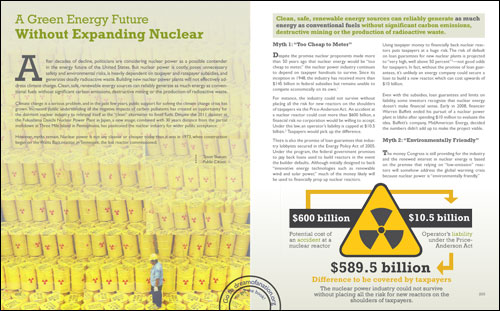A Green Energy Future Without Expanding Nuclear
During the 60s and 70s nuclear powers around the world embraced nuclear power as cheap, environmentally friendly, and safe. So far nuclear hasn’t lived up to any of these goals. Nuclear power has required $145 billion in federal subsidies to be cost-effective since its inception in 1948. Mining and refining uranium has devastated many regions of the world. And most importantly nuclear reactors continue to endanger the lives of millions, as seen most recently in the Fukushima reactor disaster in Japan in 2011. Now that viable alternatives like wind and solar exist, expanding nuclear energy no longer makes sense.
 The People’s Advocates
The People’s AdvocatesFor four decades, Public Citizen has proudly championed citizen interests before Congress, the executive branch agencies and the courts. We have successfully challenged the abusive practices of the pharmaceutical, nuclear and automobile industries, and many others. Read more.
Read the Public Citizen essay: "A Green Energy Future Without Expanding Nuclear"

Endnotes & References